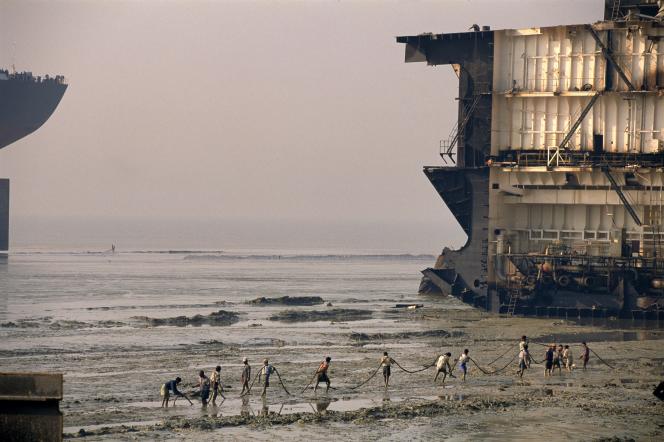The beaches of Chittagong, Bangladesh, are cemeteries where ships at the end of their life are stranded. Cruise ships, container ships, bulk carriers and tankers arrive from all over the world to be dismantled in dangerous conditions for construction workers and the environment, non-governmental organizations have been warning for more than a decade. In a report published Thursday, September 28, Human Rights Watch (HRW) documents a situation that persists and “how the maritime industry circumvents regulations”.
Along with those of Alang in India and Gadani in Pakistan, the beaches of Chittagong represent the largest shipyard in the world. Since 2020, around 20,000 Bangladeshi workers have stripped more than 520 ships in around 30 “construction sites” on behalf of companies which then resell the metal and other materials extracted from the ships. A lucrative industry (estimated at more than 2 billion dollars per year) for a poor country like Bangladesh but which hardly cares about working conditions or the environment.
The International Labor Organization considers shipbreaking one of the most dangerous activities in the world. HRW collected testimonies from around forty workers. “If I get distracted for even a moment, I can die immediately”summarizes a convict from Chittagong.
Fatal falls, poisonings, burns
The human rights association also relies on doctors’ stories: it lists fatal falls, severed legs, poisoning, burns… The NGO Shipbreaking Platform, which collaborated on the report, mentions “hundreds of injured and dead” over the last decade without being able to give a precise figure. The life expectancy of workers would be 20 years lower than that of Bangladeshis (71.8 years).
In Chittagong, the technique of “beaching” is practiced: boats sail to the coast only to run aground at high tide. They are then dismantled directly on the sand without any further precautions, exposing workers to toxic materials contained in the ships: asbestos, fuel oil, etc. which spill onto the sand and into the ocean. The workers work most of the time without protective equipment: they say they use their socks as gloves to avoid burning their hands while cutting the steel or use their shirts, for lack of masks, to avoid inhaling toxic fumes.
You have 48.4% of this article left to read. The rest is reserved for subscribers.
